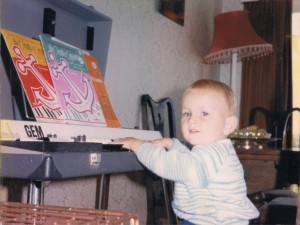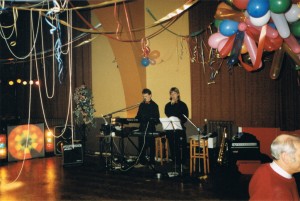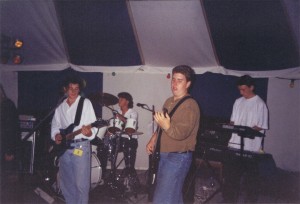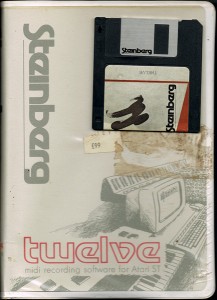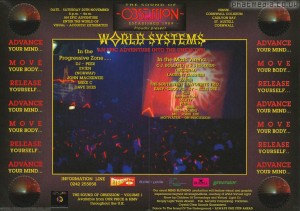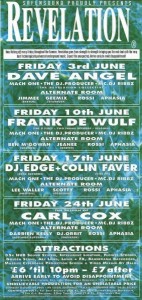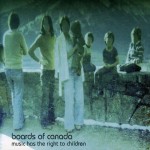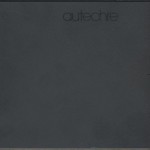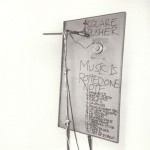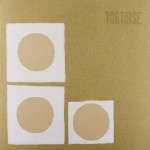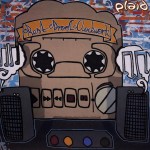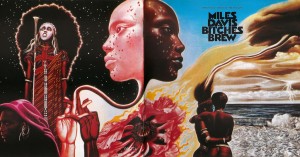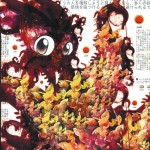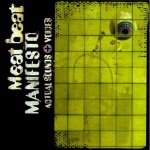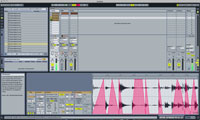Discovering Music
I was born into a musical family and was interested in music from a very early age. My Mum worked in entertainment and has always been involved in amateur dramatics and putting on musicals and variety shows in local theatres etc, many of our friends and family were musicians or singers, and musical instruments were always at hand.
My first actual memories of music are be playing around on our Wurlitzer organ as a kid, I remember it well and loved the latin drum sounds and the repeat-percussion key mode; and particularly loving the deep warm bass sound from the pedals. Rather than learning to play traditional organ pieces I was already more interested in the electronics and pressing all the buttons to find more interesting sounds, and that experience is still very much with me today; still using latin sounds & rhythms on vintage drum machines for example.
I also remember listening to my Dad’s vinyl collection including important albums like Jarre’s Oxygene and Pink Floyd’s Dark Side of the Moon. Also I remember being interested in the dance beats and fat engineering and the stereo effects on Boney M’s Nightflight to Venus; the intro is very cool.
As a primary school kid I had keyboard lessons with local organist/keyboardist Chas Muir learning left hand chord style for keyboard accompaniment. This taught me the majors minors and 7ths and started developing my chord shape theory which I rely on today, as well as the right hand synth solo playing style, but really I was much more interested in the sounds on his Yamaha YS-200 which he let me play on special occasions!
I ended up playing dodgy instrumentals of tunes like Guantanamera for Sunday lunches in local hotels, working towards the keyboard/vocalist duo’s which used to be so common around Torbay. For a time I had a partnership with the supremely talented Ross Purves in which he played saxophone lead over my keyboard playing.
Through secondary school I was in various teenage bands playing covers in local pub’s, tracks like Purple Haze, Smoke On the Water, Pink Floyd’s Money, Doors tracks etc. We also got to play a few outdoor gigs for National Music Day and other events which was cool.
Looking back on it it was brilliant fun and a good introduction to gigging and live music, but by this time I was starting to develop a home studio and collect interesting gear and becoming much more interested in electronic music and home studio recording.
The Golden Age of the Home Studio
At first I had a loosely connected keyboard rig with a Yamaha 4-track tape recorder and a super-basic early sequencer which was completely useless really, and my Acorn Electron pretending like it had some purpose in music making. But then magically somehow I got hold of an Atari 1040 STFM and a copy of Steinberg Twelve which totally changed everything – now I needed more gear, a lot more gear: drum machines, samplers, effects units, synths, a mixing desk etc etc etc.
The local second hand shop was a buzzing place back then with a dedicated music department and I was in there every opportunity I got, gradually adding more equipment and upgrading the studio in affordable steps, most of my gear came from there.
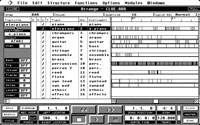
Cubase v3 on Atari
Pretty quickly I progressed to the mighty Cubase v3, a revolution in computer based sequencing, used by so many of the early 90’s electronic acts and driving the explosion in home made music. I also started mastering tracks to Philips DCC digital cassettes to get out of the age of tape hiss and crap recording quality, about the same time we got our first PC’s and the ability to burn CD’s at home.
Notable pieces I no longer have include a Roland W30 sampling workstation which I prised from a family member through emotional blackmail, and a Roland R8 drum machine. But also the inevitable hire-purchase of larger items such as my Mackie mixing desk, at one time I had 32 channels of audio gear running.
At around the same time I discovered the legendary album UFOrb by The Orb. On headphone’s the perfection of the music production is really apparent and it changed the way I listened to music, and also my standards in how good audio engineering could be.
A great light shone from within the ultraworld, showing me the first step’s that I should take towards the perfect mix – little did I realise just how long a journey that was going to be!
My next step was Performing Arts at college since it was the only thing the education system could offer me at the time, but the massive change happened by discovering the rave scene, all night hardcore, dancing, lasers, future sounding jungle technoism! I had found what I was looking for!
Almost every weekend we were getting the coaches down to the Plymouth Warehouse for the Revelations events and other raves such as Obsession World Systems, and this completely rocked my world, there was nothing else like it and this was the kind of music I most wanted to do… but unfortunately the original scene was short lived.
I consider myself fortunate to have caught the last couple of years before the major clubs and raves were shut down, partly due to the police and higher powers disliking ravers; but also the music had spiralled out of control and became saturated with rubbish, bpm’s rose towards the 200 mark in a futile attempt to get more hardcore, and the great British rave scene fragmented into separate niches; no longer the uniting force it once was – and at this time (1995) I lost interest in ‘rave music’ really, and most of us were a bit lost for a time.
Thats not to say we entirely stopped going out or listening to dance music, but that things had changed. We had some great nights in the later 90’s at Claire’s in Torquay with names like Carl Cox and LTJ Bukem, but my focus music wise had become a bit blurry and wasn’t sure exactly which direction to go in anymore.
In the later 1990’s the internet then started opening up other channels of finding new music and labels like Warp had come to my attention. Electronic music had moved into a golden age with artists like Aphex Twin, Autechre, Squarepusher, Boards of Canada, Plaid, Tortoise, Stereolab, Luke Vibert etc etc… all pioneering in someway and became a major influence on my musical directions.
- Aphex Twin – Selected Ambient Works II
- Boards Of Canada – Music Has The Right To Children
- Autechre – LP5
- Stereolab – Dots and Loops
- Wagon Christ – Tally Ho!
- Squarepusher – Music is Rotted One Note
- Tortoise – Tortoise
- Plaid – Rest Proof Clockwork
Developing Music and Modernizing the Studio
In 1999 I did City & Guilds Sound Engineering at Coombeshead College in Newton Abbot, good fun and some cool lectures and seminars including Fletcher Electro Acoustics who make Joe Meek kit. But I wasn’t really learning very much and since I wasn’t intending to use the qualification for anything in particular I decided not to continue.
Everyone had PC’s by the end of the 90’s but I’d tried to make it control my MIDI gear with dodgy results; horrible latency or other problems, and therefore I stuck with the AtariST and Cubase 3 all the way up to 2005!! Only then, hesitantly, did I replace my sequencer with Cubase SX on PC. There were drawbacks; including less-than-perfect MIDI performance, I wasn’t keen on software effects and generally didn’t really like software at all, but the advantages of computer based multi-tracking where too great to be without it.
This delay in modernising my studio cost me many years in experience with software driven music production, and it took away a lot of my enthusiasm for making music as well, some of the enjoyment had gone and I was again kinda lost; not fully at home in the studio at all… It interrupted my progress, and led to a decade of experiments and unfinished works.
Highly influential albums and artists over the years:
I’d got very into The Doors for a time and loved the Ray Manzarek organ and Fender-Rhodes electric piano playing, but it was discovering the epic two CD album Bitches Brew by Miles Davis which introduced me to Chick Corea. The first time I listened to this album I didn’t like it at all, but it warmed on me; and over time realised just how ground-breaking it was.
Improvisation upon a theme, and some pretty experimental production such as a drummer for each channel! Chick is the master of the Fender-Rhodes electric piano and his playing on this album is a masterclass in how to play dark jazz chords and abstract improvisation. One day I shall own a Fender-Rhodes!
Another album which has had a profound influence on me is Ilkae’s Pistachio Island, I don’t know another album like it – 45 tracks with an average length of about 1.3 minutes, on the CD it says “best heard in shuffle mode”! I have never listened to it in shuffle mode; maybe I should! But the point is that each tune is essentially just a loop; 64 bars or so, and none of the tunes have intros or outros as such; which means the album has a uniquely pleasing continuity. This may have something to do with the way I’ve been treating many of my tunes; Polymath album onwards…
I have to include a section about Meat Beat Manifesto, or Jack Dangers – one of the world leaders in synthesizer use and abuse, and I’d go as far as saying perhaps the best acid sequence producer out there. I’d always loved his early work such as Satyricon, but “Actual Sounds + Voices” is absolutely my favorite MBM work – blending all of his finest attributes into one awesome album.
Jack has never got stuck in his ways, or tried to copy himself, instead he is constantly evolving and innovating, I still look forward to every release that comes out and am never disappointed. Personally I always want to hear abstract analog acid sequences from obscure synths or modular madness; but it’s also his use of vocal samples and breakbeats etc which make his music so thoroughly entertaining. Long live MBM and keep the tunes coming Jack!
For some reason I’d missed one of the most important synthesizer pioneers of all time until fairly recently. Keyboard player in Hawkwind; not a band I particularly like, but better known for his huge collection of solo work, live performances, and classic albums like Timewind.
This video really sums up just how influential and original Klaus Schulze was even as early as 1977 – and also that you can actually do it live! You could argue this was the birth of trance music right here…
Current Status – Things are looking up!
So I’ve had a decade of experience with a PC running the studio now and there have been some big changes. I’ve switched to Ableton Live as a sequencer; mainly because of its fresh approach to loop based patterns, but also how processor friendly it is and the functionality and expandability of Max4Live. I no longer use a hardware mixing desk; instead having my 6 hardware synths going directly into my soundcard. And in recent times I have found a list of very high quality plugins which I find inspiring and very creative; thus erasing any concerns I had about the quality of software reverbs for example.
The other enormous change is discovering that modern dance music is not all rubbish! I just happened to be at a music festival and was roaming around observing ‘what kids dance to these days’, and the sound of psytrance kicking out of a high quality modern sound system really got me interested, it actually sounded really really good! Over a few years and a few festivals I’ve got seriously addicted to the modern psychedelic scene, the fests themselves have a great friendly hippy vibe and I’m now involved with various events and am gaining experience and insight into the music all the time.
SoundCloud has had a big effect too, providing a community of other musicians to connect with; as well as providing a window on the music to learn from, I spend more time listening to SC than anything else now, and am constantly researching Psy artists and labels, refining my understanding of the sub-genres, and giving me reference material to compare my own music with.
So over the last few years I’ve had a lot to learn about modern music production and had to develop a whole new method for writing music. I’m not there yet; but I am making big progress with the quality of engineering and am trying very hard to complete this very long journey to totally professional published music and live performance… I am now DJ’ing psy nights locally, and I hope to play/release some of my own music within the next year 😉
